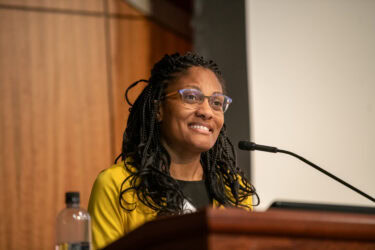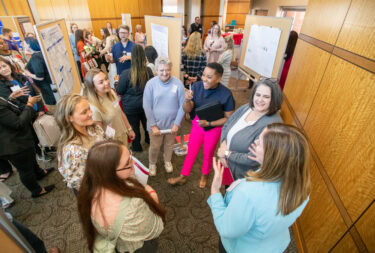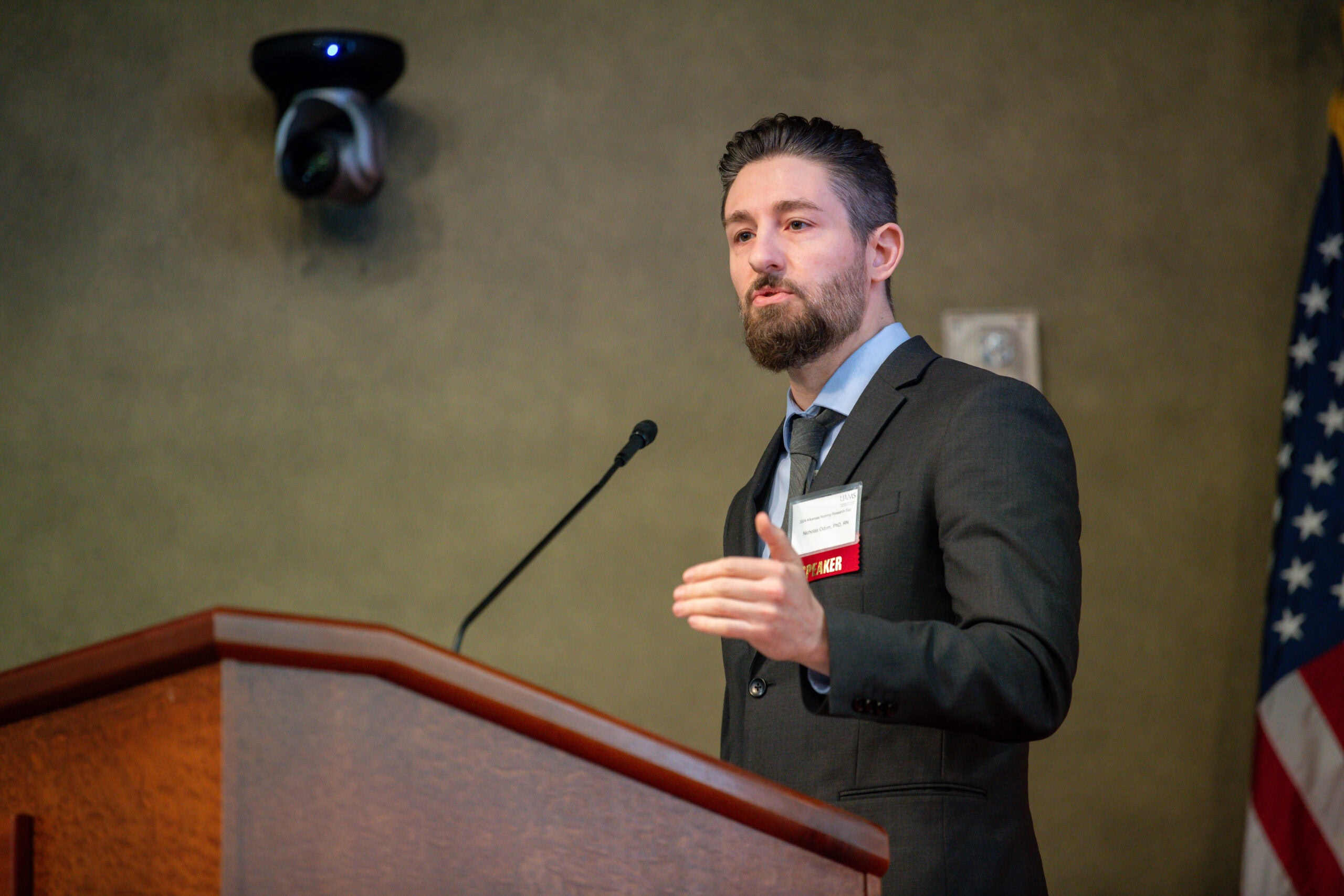UAMS Hosts Statewide Conference to Showcase Advances in Nursing Research
| Nurses and nursing students from across the state gathered April 5 on the University of Arkansas for Medical Sciences (UAMS) campus for a conference that highlighted recent advances in research.
Organized by the UAMS College of Nursing and the UAMS Office of Continuing Education, the 2024 Arkansas Nursing Research Day conference focused on the theme of “Nurses as Active Drivers of Positive Change in Health Care.” The event featured a mix of podium and poster presentations from students and nursing professionals who are striving to improve health outcomes through research and evidence-based projects.
Janiece Taylor, Ph.D., RN, assistant professor at the Johns Hopkins University School of Nursing, served as guest speaker for the conference’s morning keynote session, giving a lecture on equity in pain management. She started her speech by asking attendees whether they had ever experienced pain, drawing a show of raised hands throughout the auditorium.
“I developed an interest in pain research because of how prevalent it is, how impactful it is,” she said. “It touches so many facets of a person’s life.”

Janiece Taylor, assistant professor at the Johns Hopkins University School of Nursing, served as guest speaker for the conference’s morning keynote session, giving a lecture on equity in pain management.Image by Bryan Clifton
While noting that pain doesn’t discriminate, Taylor said researchers have found that underrepresented groups have higher rates of unmanaged pain. Many of these groups receive fewer prescriptions and fewer referrals to pain management specialists and physical therapists, she said.
Unmanaged pain not only affects people’s quality of life, but it also can worsen their mental health, she said.
Taylor described her research on this subject, including her search for an intervention that addresses chronic pain in older Black women. The effort led her to create an adaptation of “Get Busy, Get Better,” a Philadelphia-area program that helps older Black residents who are struggling with depression.
Taylor’s program sought to educate women and empower them to communicate about their pain and their mental health. Patients set their own health objectives, then took part in a series of one-on-one sessions with nurses who helped them develop strategies to meet those goals.
Nearly all of the 23 women who completed the study reported having partially or fully completed their goals, Taylor said. She noted the example of a woman who needed help coping with the deaths of her husband and son and who wanted to ease her chronic pain so she could take up knitting. Addressing both of those goals, large and small, made a significant difference in the woman’s life.
“It really reminded me of why we do the work that we do,” Taylor said. “Her pain and her mood improved, and she once again began to interact with her community and her friends.”
Taylor’s speech was made possible by the UAMS College of Nursing’s Alice An-Loh Sun Endowment.
The conference’s afternoon session featured a lecture from Nicholas Odom, Ph.D., RN, associate professor in the School of Nursing at the University of Alabama at Birmingham. Odom’s speech, part of UAMS’ Dalme-Rickel Visiting Lectureship in Oncology/Community Health, focused on ways to support the caregivers of patients with advanced cancer.
According to a 2020 survey from the National Alliance for Caregiving, a nonprofit coalition of caregiving organizations, about 3.3 million Americans reported having provided care to a loved one with cancer. Many of these caregivers oversee complicated regimens of medications and other treatments, Odom said.
“They’re taking on the tasks that nurses, social workers and physicians typically perform, but they’re doing this in the home with no training,” he said.

Nursing professionals and students talk about the latest research during poster presentations at the conference.Image by Bryan Clifton
Odom noted that caregivers face emotional and financial strains that can have negative effects on their own health. It’s a problem that’s likely to get worse, he said, citing the rising proportion of cancer patients and the increasing complexity of home-based medical management.
Odom is currently conducting a trial for Project Cornerstone, a support program for Black and rural residents who provide care to advanced cancer patients. Trained navigators conduct a series of sessions with these caregivers, helping them cope with stress, improve their support skills and plan for the future.
About 75% of cancer centers in the United States offer support programs for caregivers, but the initiatives are rarely rooted in scientifically tested interventions, he said. The cancer centers face many challenges when implementing programs, including a lack of data on their costs. However, Odom noted that efforts are underway to address the issue, with the National Cancer Institute studying not only the efficacy of these programs but also their financial impact.
“We should soon have more data that evaluates the economics of these interventions,” he said.
In addition to the guest lecturers, several faculty members from the College of Nursing presented research findings. Patricia Cowan, Ph.D., RN, dean of the College of Nursing, spoke about a study of how wellness retreats improved the well-being of nurses experiencing burnout. Other presentations focused on topics such as epidurals and blood culture contamination rates.
Pearman Parker, Ph.D., RN, assistant professor in the College of Nursing and chair of the Arkansas Nursing Research Day conference, said the faculty presentations highlighted the innovative nursing research being conducted throughout the state. She also praised the students’ poster presentations, which showcased the ways in which nurses effect change in research and clinical practice.
“It was so exciting to see Arkansas Nursing Research Day come together,” she said. “This was our first in-person conference in five years, and I couldn’t have been happier with the turnout and enthusiasm for this event.”
